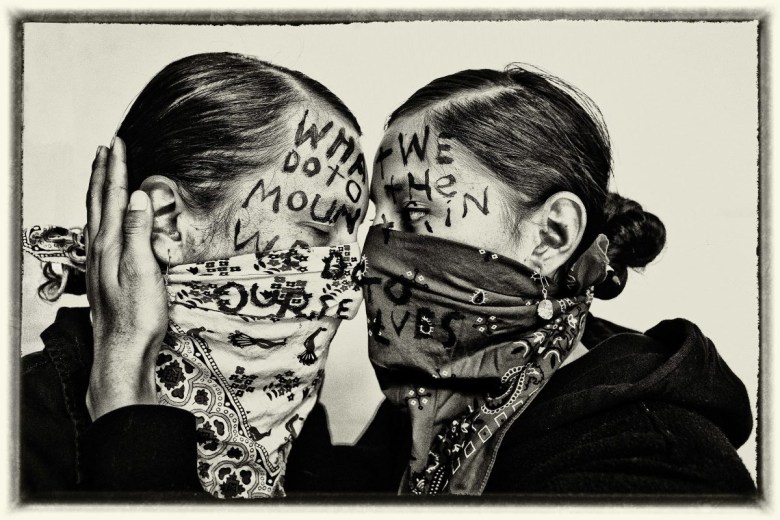
PHOENIX — Multiple communities are mourning the loss of Klee Benally, an anti-colonial Indigenous activist, installation artist, filmmaker, and musician whose work centered around land rights, Indigenous liberation, and climate justice. The respected Diné artist and organizer passed away in Phoenix, Arizona, on December 30 at the age of 48.
Born October 6, 1975, in Black Mesa, Arizona, on the Diné Nation, Benally resided in Flagstaff (known as Kinłání in Diné) and was a regular fixture of activism and mutual aid efforts. A strong voice of resistance against land encroachment, police violence against Indigenous peoples, and environmental racism, he frequently led and organized protests with Indigenous Action, a group he founded in 2001 for the purpose of the “liberation for Mother Earth and all her beings.”
In addition to his work as an organizer and anarchist, Benally was a celebrated musician and award-winning filmmaker. His 2016 feature film Power Lines investigated generational trauma and the impacts of forced relocation and was awarded Best Picture at the Red Nation Film Festival. Benally’s visual art practice was inextricably linked to his work as an anti-colonial agitator: His virtual reality installation “Poise/End” (2017) at the Coconino Center for the Arts in Flagstaff, included in their 2017 exhibition Hope and Trauma in a Poisoned Land, looked at the devastating impacts of abandoned uranium mines on the Diné Nation, including lack of access to safe drinking water and high incidences of cancer. Benally, along with his siblings Clayson Benally and Jeneda Benally, performed as the band Blackfire, which blended elements of traditional Diné music, punk rock, and folk to create politically charged compositions bearing witness to and protesting political crimes against Indigenous peoples and their territories.
Benally founded many collectives and spaces including Táala Hooghan Infoshop, an Indigenous-established, community-based collective of volunteers who work to address social, economic, environmental, and colonial injustices in and around Flagstaff. Through the Infoshop, Benally and his colleagues ran clothing drives for unsheltered Indigenous people, created a garden to grow food for distribution, and hosted all-ages shows, film screenings, and self-fulfillment workshops all centered around active opposition to colonialism, capitalism, authoritarianism, hetero-patriarchy, and white supremacy. Benally also formed and volunteered in initiatives for Haul No!, Clean Up the Mines, and Outta Your Backpack Media.
A major battle that Benally fought throughout his life was the assault against Indigenous sacred places, in particular the protection of the San Francisco Peaks, known as Dook’o’oosłííd by the Diné people, just north of Flagstaff — a significant religious site to 13 tribes in the region and one of the four mountains sacred to the Diné people. Benally opposed the expansion of the Arizona Snowbowl, a ski resort installed on the mountain. In 2005, the ski area developed a system of artificial snow-making by clearcutting over 30,000 trees on a 74-acre land area in order to pipe an estimated 1.5 million gallons per day of treated sewage water onto the mountain. Benally actively resisted this desecration of the sacred site, leading marches and actions to stop the continued construction and decimation of the mountain.
In 2011, Benally and his wife Princess Benally collaborated with artist Chip Thomas (known as Jetsonorama) on a public art project in downtown Flagstaff featuring the two gazing at each other, forehead to forehead, with the words “What we do to the mountain, we do to ourselves” scrawled across them — an active, agitprop installation meant to bring awareness to the desecration of the sacred site.
Last November, Benally published his book No Spiritual Surrender: Indigenous Anarchy in Defense of the Sacred, an unflinching criticism and analysis of colonial occupation and frontline resistance.
The response on social media following the news of Benally’s death was abundant, with some mourning the loss of their dear friend and many others who did not know him personally remarking on the indelible impact he made towards Indigenous liberation and the protection of the Earth.